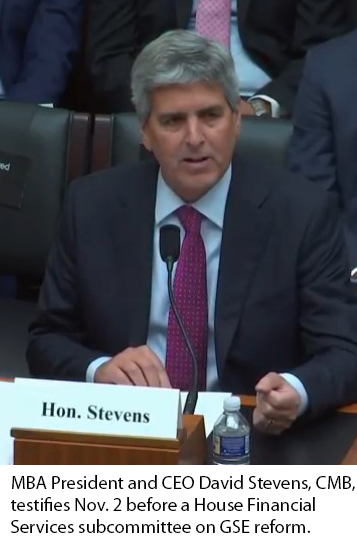
Stevens: Only Congress Can Provide Legitimacy, Public Confidence to Housing Reform
Mortgage Bankers Association President and CEO David Stevens, CMB, testifying Nov. 2 before a House Financial Services subcommittee, said without comprehensive legislative secondary mortgage market reform, “borrowers, taxpayers and lenders will all face increased risk and uncertainty about the future.”
 “I will cut right to the chase: the time to act on comprehensive legislative reform is now,” Stevens told members of the Financial Services subcommittee on Housing and Insurance. “Despite the positive steps [the Federal Housing Finance Agency] has taken as conservator, only Congress can provide the legitimacy and public confidence needed for long-term stability in both the primary and secondary mortgage markets.”
“I will cut right to the chase: the time to act on comprehensive legislative reform is now,” Stevens told members of the Financial Services subcommittee on Housing and Insurance. “Despite the positive steps [the Federal Housing Finance Agency] has taken as conservator, only Congress can provide the legitimacy and public confidence needed for long-term stability in both the primary and secondary mortgage markets.”
Stevens (https://financialservices.house.gov/uploadedfiles/hhrg-115-ba04-wstate-dstevens-20171102.pdf) noted nine years have passed since Fannie Mae and Freddie Mac were placed in conservatorship, yet their long-term status remains unresolved. “Extended conservatorship is economically and politically unsustainable, and it is an unacceptable long-term outcome,” he said. “Without comprehensive reform, borrowers, taxpayers and lenders will all face increased risk and uncertainty about the future.”
In April, MBA released GSE Reform: Creating a Sustainable, More Vibrant Secondary Mortgage Market (https://www.mba.org/issues/gse-reform). It outlines the key principles and guardrails that should guide the reform effort and provides a detailed picture of a new secondary-market end state. The paper has gained a supportive audience on Capitol Hill and is serving as a blueprint for several legislative proposals for secondary market reform.
The MBA proposal “ensures equitable access for all lenders to the secondary market, prohibiting special pricing and underwriting based on loan volume as occurred prior to conservatorship, preserving the cash window and small pool execution options, and preventing vertical integration by the largest market participants,” Stevens said. “Our proposal recognizes the need for any comprehensive GSE reform plan to balance three major priorities: consumer cost and access to credit; taxpayer protection; and investor confidence.”
To achieve these policy objectives, Stevens said the MBA plan recommends recasting the GSEs’ current charters and allowing a multiple-Guarantor model that features at least two entities and preferably more.
“Guarantors would be monoline, regulated utilities owned by private shareholders, operating in the single-family and multifamily markets,” Stevens said. “The core justification for utility-style regulation is that privately-owned utilities attract patient capital and derive certain benefits by virtue of their federal charters.”
Under the MBA plan, Guarantors would be subject to rigorous capital requirements that would provide financial stability without unduly raising the cost of credit for borrowers. These requirements would be satisfied through multiple layers of private capital, including proven means of credit risk transfer.Stevens noted the implicit government guarantee that existed before the conservatorship of Fannie Mae and Freddie Mac would be replaced with a legislated explicit guarantee at the mortgage-backed securities level only. This guarantee would be supported by a federal insurance fund with appropriately-priced premiums paid by the Guarantors, much like banks pay for Federal Deposit Insurance-Corp. insurance.
“Our plan explicitly calls for deeper first-loss risk sharing that is transparent, scalable to all lenders,and capable of limiting taxpayer exposure only to catastrophic risk,” Stevens said.
Just as importantly, Stevens said MBA also developed recommendations in two areas that have vexed past reform efforts: 1) the appropriate transition to a new system and 2) the role of the secondary market in advancing a national affordable-housing strategy.
“GSE reform holds the potential to help stabilize the housing market for decades to come,” Stevens said. “Our proposal specifically notes the importance of leveraging the assets, infrastructure, and regulatory framework of the current system. We also believe that any workable transition must utilize a clear road map and be multi-year in nature.”
The MBA plan develops an affordable-housing framework that covers both renters and homeowners of varying income levels. “Our plan suggests other improvements to better serve the full continuum of households, including updating credit-scoring models and better capturing nontraditional income,” Stevens said. “Our framework has outcomes that are transparent, well-defined, measurable and enforceable.”
Stevens noted FHFA has put in place a number of policies and procedures to improve access to the secondary mortgage market and reduce the risks to taxpayers.
“Now is the time for Congress to act to ‘lock in’ these improvements,” Stevens said. “Only Congress can alter the existing GSE charters, establish an explicit federal government guarantee and create a regulatory mandate to maintain a level playing field. We cannot go back to a housing finance system that provides private gains when markets are strong yet relies on support from taxpayers when losses occur.”
Stevens pointed out calls to simply recapitalize the GSEs and allow them to operate without further structural changes are “misguided.” Under such plans, the post-crisis administrative reforms already achieved could be reversed.
“The American people rely on a mortgage finance system that enables them to access quality, affordable rental housing, buy their first home or build a nest egg to pass on to their children,” Stevens said. “We owe it to them to proceed with the hard work of reform without delay.”
Also testifying yesterday: Jerry Howard, CEO of the National Association of Home Builders; Dan Goodwin, Director of Mortgage Policy with the Structured Finance Industry Group; Sarah Edelman, Director of Housing Policy with the Center for American Progress; Kevin Brown, Chair of the Conventional Financing & Policy Committee with the National Association of Realtors; and Robert DeWitt, Chairman of the National Multifamily Housing Council.
